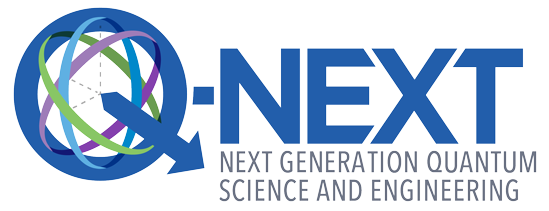In the News
-
IQUIST-NRIK collaboration to build the first quantum network with open-air links
From the Illinois Quantum Information Science and Technology Center: Q-NEXT research lead Paul Kwiat has joined an initiative led by the National Research Institute of Korea in which researchers will construct a distributed quantum network connecting nodes separated by 20 kilometers. Read More
-
Top Italian scientific foundation presents Giulia Galli with Lifetime Achievement Award
From the University of Chicago: The Italian Scientists and Scholars in North America Foundation has presented Giulia Galli, Liew Family Professor of Molecular Engineering and chemistry at the University of Chicago, with a Lifetime Achievement Award for her seminal contributions to the development of methods for the prediction of materials’ properties. Read More
-
Colorado quantum startup ColdQuanta lands $110M Series B to usher in a new era of quantum computing
From Tech Startups: Quantum company ColdQuanta said it has raised $110 million in a Series B funding round to continue commercializing its product portfolio, including quantum computing, quantum algorithms and applications, atomic clocks, sensors, and components. Read More
-
A quantum-computing startup gets big-name backing
From Crain's Chicago Business: Former Motorola CEO Chris Galvin invests in and joins the board of ColdQuanta, which acquired University of Chicago-born quantum startup Super.tech. Read More
-
Envisioning quantum networks: Photonics history fuels hopes of achieving quantum’s bold promise
From SPIE: Paul Kwiat appears in this piece on the steps the quantum community will need to take to realize quantum networks and how the National Quantum Initiative and other agencies and institutions are working to jumpstart quantum networking activity in the United States. Read More
-
Quantum startup ColdQuanta draws investors with ‘here-and-now’ applications
From The Wall Street Journal: ColdQuanta, a quantum-computing startup based in Boulder, Colorado, has raised $110 million in a Series B round, drawing investors in a tight market with near-term plans to harness and sell the present-day capabilities of a technology whose full potential is still years away. The company will use the new capital to accelerate efforts to develop revenue-generating hardware and software systems that leverage quantum technology in areas like atomic clocks, sensors and higher-precision radio frequencies and GPS networks. Read More
-
‘Real-world impact’: Stanford Board of Trustees learns how SLAC can change the future
From Stanford Report: Q-NEXT is an example of how Stanford University and SLAC National Accelerator Laboratory are accelerating translational science at a recent Stanford Board of Trustees meeting focused on SLAC research. Read More
-
Chicago high schoolers become first members of the U.S. public to use ultrasecure quantum technology in mock voting event
From the Chicago Quantum Exchange: Kenwood Academy High School students visited the Chicago Quantum Exchange, where they cast unhackable votes over a quantum network — with a special visit from former President Barack Obama. Read More
-
Using quantum data to create an unhackable Internet: ‘We’re getting close,’ University of Chicago expert leading project says
From the Chicago Sun-Times: University of Chicago scientists are working on creating what once might have seemed like science fiction: an unhackable internet. The Chicago quantum network project involves a test bed of 124 miles of underground fiber-optic cable that links the university with Argonne National Laboratory in Lemont and Fermilab in Batavia. Read More
-
Danna Freedman receives 2022 MacArthur Fellowship
From MIT News: Danna Freedman, the F.G. Keyes Professor of Chemistry at MIT and a Q-NEXT member, has been named a recipient of a 2022 MacArthur Fellowship. Freedman designs novel molecules that could be used for quantum sensing and communication. Read More
News and features
See all news and features-
Design rules and synthesis of quantum memory candidates
From the University of Illinois Urbana-Champaign: Researchers use density functional theory calculations to identify possible europium compounds to serve as a new quantum memory platform. They also synthesize one of the predicted compounds, a brand new, air-stable material that is a strong candidate for use… Read More
-
‘Ruler for light’ could enable detailed measurement in personal devices
Frequency combs have revolutionized precision measurement, but the bulky, power-hungry devices are limited to lab settings. A new efficient laser “microcomb” developed by Stanford researchers could bring that revolution to the handheld electronics realm. Read More
-
Resurrecting niobium for quantum science
For years, niobium was considered an underperformer when it came to superconducting qubits. Now scientists supported by Q-NEXT have found a way to engineer a high-performing niobium-based qubit and so take advantage of niobium’s superior qualities. Read More
-
Researchers from startups, government labs and academia develop new techniques for making qubits out of erbium
Argonne project addresses quantum technology challenges and highlight sthe versatility of a rare-earth metal used in lasers and to color glass. Read More
-
Meet Edward Schmitt, facilities engineer
Former Marine Corps electronics technician Edward Schmitt keeps the Argonne Quantum Foundry running while advocating for veterans. Read More
